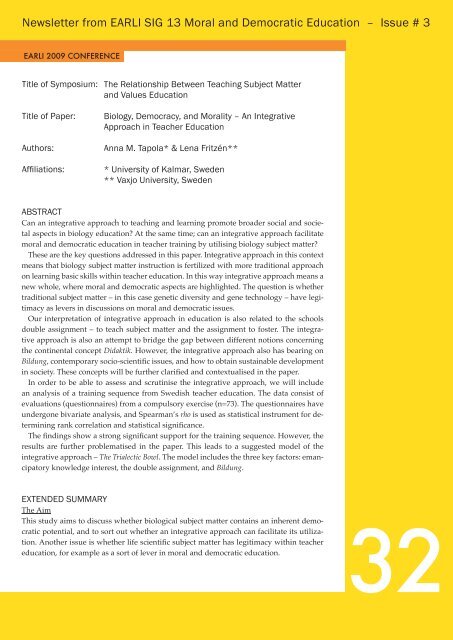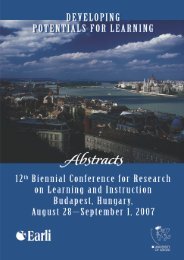<strong>Newsletter</strong> from EARLI SIG 13 Moral and Democratic Education – Issue # 3EARLI <strong>2009</strong> CONFERENCETitle of Symposium:Title of Paper:Authors:Affiliations:The Relationship Between Teaching Subject Matterand Values EducationBiology, Democracy, and Morality – An IntegrativeApproach in Teacher EducationAnna M. Tapola* & Lena Fritzén*** University of Kalmar, Sweden** Vaxjo University, SwedenABSTRACTCan an integrative approach to teaching and learning promote broader social and societalaspects in biology education? At the same time; can an integrative approach facilitatemoral and democratic education in teacher training by utilising biology subject matter?These are the key questions addressed in this paper. Integrative approach in this contextmeans that biology subject matter instruction is fertilized with more traditional approachon learning basic skills within teacher education. In this way integrative approach means anew whole, where moral and democratic aspects are highlighted. The question is whethertraditional subject matter – in this case genetic diversity and gene technology – have legitimacyas levers in discussions on moral and democratic issues.Our interpretation of integrative approach in education is also related to the schoolsdouble assignment – to teach subject matter and the assignment to foster. The integrativeapproach is also an attempt to bridge the gap between different notions concerningthe continental concept Didaktik. However, the integrative approach also has bearing onBildung, contemporary socio-scientific issues, and how to obtain sustainable developmentin society. These concepts will be further clarified and contextualised in the paper.In order to be able to assess and scrutinise the integrative approach, we will includean analysis of a training sequence from Swedish teacher education. The data consist ofevaluations (questionnaires) from a compulsory exercise (n=73). The questionnaires haveundergone bivariate analysis, and Spearman’s rho is used as statistical instrument for determiningrank correlation and statistical significance.The findings show a strong significant support for the training sequence. However, theresults are further problematised in the paper. This leads to a suggested model of theintegrative approach – The Trialectic Bowl. The model includes the three key factors: emancipatoryknowledge interest, the double assignment, and Bildung.EXTENDED SUMMARYThe AimThis study aims to discuss whether biological subject matter contains an inherent democraticpotential, and to sort out whether an integrative approach can facilitate its utilization.Another issue is whether life scientific subject matter has legitimacy within teachereducation, for example as a sort of lever in moral and democratic education.32
<strong>Newsletter</strong> from EARLI SIG 13 Moral and Democratic Education – Issue # 3EARLI <strong>2009</strong> CONFERENCEThe ProblemEver since the 1980s there has been an unfortunate and pronounced separation betweensubject-related instruction and more traditional outlooks on learning and instruction thatare common in general pedagogy in Sweden and elsewhere. When Marton (1986a, 1986b)re-invented Didaktik in Sweden, he also contributed a division between referring to generallearning and instruction in pedagogy, and its counterpart linked to subject matterinstruction. This demarcation has strongly dominated some research areas, which is unfortunatebecause of its biased consequences.This has led to radical consequences for research on moral and democratic education, aswell as science education research and other scholarly areas. In those cases where an ambitionhas existed to integrate theoretical development within a specific subject, it has almostexclusively involved different aspects of learning, and then mostly the individual pupil’slearning of various central concepts within the subject (see for example Vosniadou, 1994).In our understanding, this implies that constructivist influences have been pronounced,and still are significant. As such, there is an underlying critique in our position. However,this should not be understood our singling out constructivists and their research duringthe past 20 years. Quite the opposite. These research outcomes have in many cases beenmost important. However, if the research community wishes to strive for further problematisationof the subject’s potential in a wider societal sense, paying particular attention tomore comprehensive questions about morality and fundamental democratic values, thanthe body of scholarly works need to be complemented with alternative ontologies andepistemological approaches. This paper is an attempt to remedy the lack of alternativestrategies.Theoretical and Educational SignificanceIntegrative approach has profound support from Swedish regulatory documents. Otherdemocracies probably have similar official documents and laws. The integrative approachis also significantly related to the school’s double assignment: to communicate knowledgeabout subject matter and to contribute to the democratic upbringing of the learners. Thedouble assignment is frequently referred to in Swedish teacher education and teacherpractices. Other countries probably have significant expressions with similar meaning.For example, the Dutch equivalent could be said to be what Veugelers and Vedder (2003)call ‘the pedagogical mission of the schools’ or ‘the pedagogical mission of education’. Aparallel discussion can be found in Oser’s review (1994). However, he prefers to discussthe issues in terms of ’effectiveness’ and ’professional responsibility’.Various integrative teaching methods, strategies, and instructions have also been underscientific scrutiny for decades (see for example Atkinson & Crowe, 2006; Gadotti &McLaren, 1996; Patry, Weyringer & Weinberger, 2007). Our version of integrative approachis grounded in critical theory and dialectics. In this text, the term integrative is used to describean approach that is – in a traditional sense – neither pure subject-related instruction,nor general learning and instruction, nor pure pedagogy. The idea is to discuss whetheran integrative approach can – in a dialectical view – create a new whole where the school’sdouble assignment can counteract the established division referred to above.Research designA quantitative research design was applied in this study. In order to be able to assess33
















